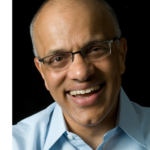You know, right after 9/11. I still remember driving to work. My brother woke me up early in the morning. We were living in Seattle that time, West Coast Pacific Time. He was in D.C., East Coast time. And he said, turn on the TV and see what's going on. That's how I found the news. And, you know, driving into my office, listening to the radio, another plane crash and you could feel the despair, right? Walking to... People were in shock when I got to work. And so dealing with the 9/11 crisis and its aftermath both on our staff, several of them were trapped in New York City that time. And, you know, trying to figure out where they were, how to get them out. And then our home staff, who were just completely shell shocked as a country, we were as a people and as a community that we were coming...
In the next 48 hours. I realize I mean, this was 9/11. If you look at the world of nonprofits, about somewhere between 40 to 60 percent of our revenues come in the last 60 days of the year. So we were approaching our peak season. And if we didn't make our goals that year, there was going to be very deep negative repercussions on the following years. The first week of October, I said, OK, I want to get everybody, everybody who's got a part in executing our plans for the fourth quarter of the year together for two days. Our marketing agency, the advertising agencies, my leadership staff, you know, the team leaders for our phone call centers. I don't care who you are. We're going to come together and we'll take three days. We will leave when we have a plan. So we didn't have enough of a big enough place for us to meet in the office. So we actually ended up renting a nearby Holiday Inn And we just hunkered down at the Holiday Inn. And we spent three days we left with a plan at the end of those three days. I'm proud to tell you. That year revenues actually went up, but that was probably in my career the toughest time because, you know, you almost feel the weight of the world. If we don't get this right, it's not that we might suffer directly, but those who depend on us. And we're a humanitarian organization, the people who depend on us don't have anything else.






